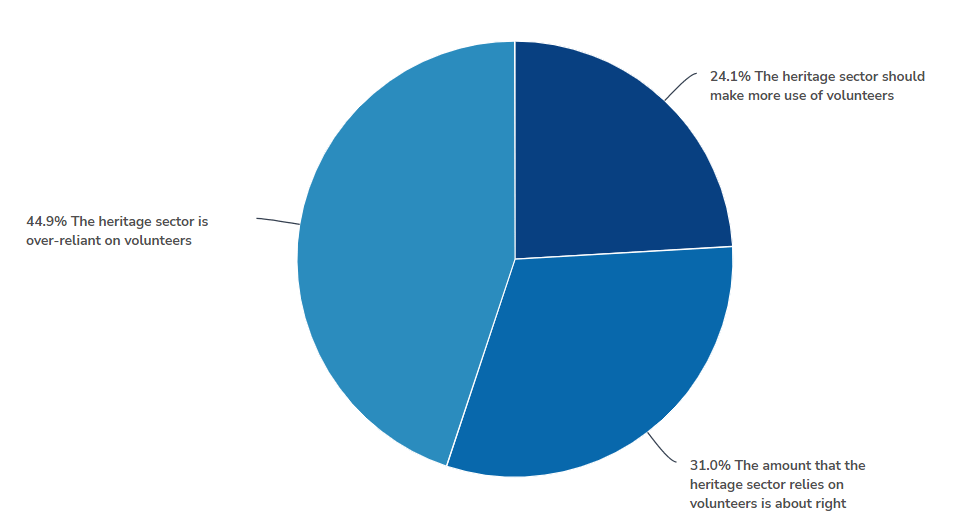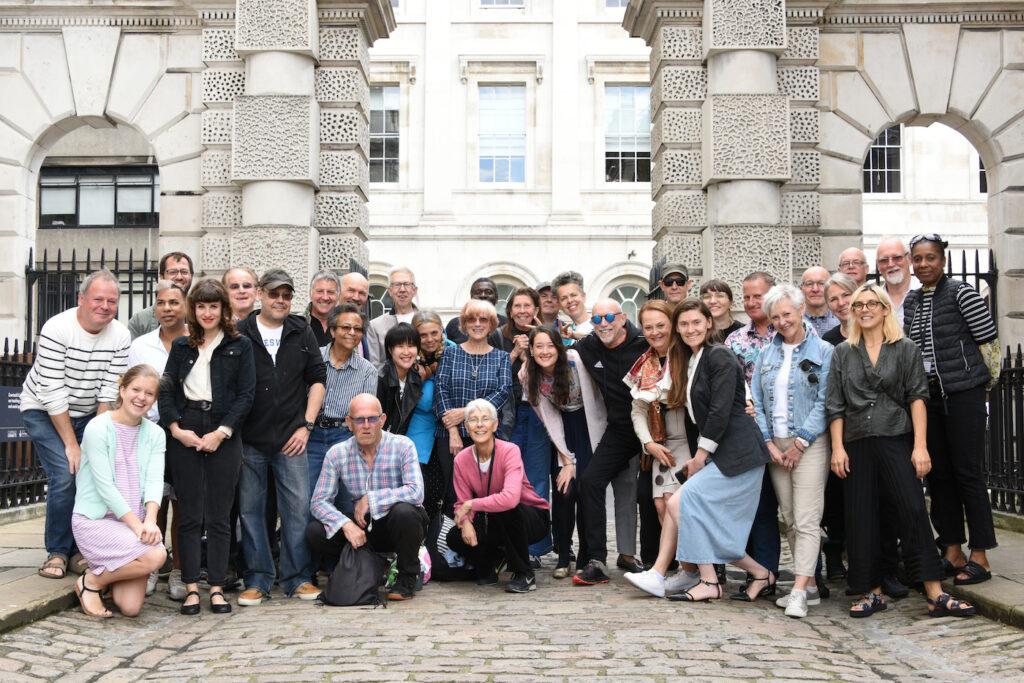Results from March 2023 Panel Research
In March, 241 panel members completed the UK Heritage Pulse survey on the theme of volunteering.
The questions covered the management and retention of volunteers and the particular business areas where organisations rely most on volunteers. In addition, respondents had a chance to reflect overall on the relationship between volunteering and the heritage sector, and tell us a bit more about their experience.
Thank you to all of those who responded.
🔍 Click on any chart to zoom in.
Sector faces challenges in recruitment of new volunteers
When asked about their experience over the past year with recruiting new volunteers, responses suggest a mixed picture, with 44% of organisations saying they had found this challenging. Organisations with higher turnover (over £1m pa) and those who work with larger numbers of volunteers (50+) have found it slightly less challenging than smaller organisations.
What has been your experience over the past year with recruiting and retaining volunteers? [select one answer per line]
| 1 We found this challenging | 2 | 3 | 4 | 5 This has gone well | |
|---|---|---|---|---|---|
| Recruitment of new volunteers Count Row% | 36 22.1% | 36 22.1% | 36 22.1% | 27 16.6% | 23 14.1% |
| Recruitment of existing volunteers Count Row % | 13 8.0% | 23 14.2% | 41 25.3% | 43 26.5% | 4 2.5% |
| Attracting volunteers from a broad range of ages & backgrounds Count Row % | 50 30.9% | 44 27.2% | 40 24.7% | 10 6.2% | 5 3.1% |
Even more difficult though – for organisations of all sizes – was recruiting volunteers from a broad range of ages and backgrounds. 58% of respondents found this challenging, and only 14% said it has gone well.
![Picture of a graph showing respondents answers to What has been your experience over the past year with recruiting and retaining volunteers? [select one answer per line]](https://heritagepulse.insights-alliance.com/wp-content/uploads/2023/04/Experience-of-Vols-1024x385.png)
Retention of existing volunteers has been less of an issue however. For over half of organisations this has gone well in the last year, while 22% were finding it challenging. Organisations with a lower turnover (under £1m pa) find it easier to retain volunteers than larger organisations.
“Recruitment and retention has been reasonably ok. We have been successful in recruiting a greater number of under-represented audiences but this has required a substantial investment of time.”
“We attract lots of volunteers as the prospect of working outdoors is very appealing to a lot of people. We’ve put emphasis on diversifying our volunteer base but we aren’t having much success in attracting people from more varied backgrounds.”
“Covid has had a huge impact with volunteers. Our charity is run entirely by volunteers and we are genuinely struggling. People’s priorities have changed…”
“We have a loyal cohort of several hundred volunteers with a steady stream of new recruits to replace older volunteers.”
There is a reliance on volunteers in a significant number of business areas
There are six areas of business operation for which more than a third of respondents said they were reliant on volunteers to function at full capacity. Almost half said they were reliant on volunteers for public facing roles – engaging with visitors through interpretation, tours or room hosting. 38% said they need volunteers for the delivery of education and learning programmes. A number of organisations also mentioned governance as a key business area which involves volunteers.
42% of respondents said their organisation relies on volunteers for technical skills like maintenance, while 39% rely on them for administration and finance. Around a third are reliant for research / archaeology and conservation / collections management.
There is a stark difference in responses from organisations of different sizes. Those with lower turnover are relying on volunteers much more heavily than those with higher turnover, with more than half saying they were reliant on volunteers for administration/finance and public facing roles.
In which areas is your organisation reliant on volunteers to function at full capacity? [Select all that apply]
| Value | % | Responses |
| Administration / Finance | 39.3% | 59 |
| Collections accession or cataloguing | 26.7% | 40 |
| Conservation or collections management | 33.3% | 50 |
| Delivering or supporting education and learning programmes | 38.0% | 57 |
| Engaging with visitors through interpretation, tours, or room hosting | 46.7% | 70 |
| Engaging with visitors transactionally, e.g. ticket or cafe sales | 22.7% | 34 |
| Engaging with visitors through another way (non-transactionally) | 28.7% | 43 |
| Managing Health & Safety | 28.7% | 43 |
| Marketing | 24.7% | 37 |
| Pastoral roles (e.g. for staff, visitors, or other volunteers) | 17.3% | 26 |
| Research / archaeology | 35.3% | 53 |
| Technical skills – e.g. maintenance | 42.0% | 63 |
| Security | 13.3% | 20 |
| None of the above | 17.3% | 26 |
![Picture of a graph showing respondents response to In which areas is your organisation reliant on volunteers to function at full capacity? [Select all that apply]](https://heritagepulse.insights-alliance.com/wp-content/uploads/2023/04/Reliance-of-vols-1024x369.png)
Clear perception of over-reliance on volunteers, but one in four think the sector could make more use of them
45% of respondents said that the sector is over-reliant on volunteers, but 24% think that there is an opportunity to make more use of volunteers.
Just under a third of respondents said they think the level of reliance is ‘about right’. Overall, smaller organisations tend to feel the overreliance more keenly.
Thinking about the heritage sector as a whole, please choose which of the statements below best reflects your opinion:
| Value | % | Responses |
| The heritage sector should make more use of volunteers | 24.1% | 45 |
| The amount that the heritage sector relies on volunteers is about right | 31.0% | 58 |
| The heritage sector is over-reliant on volunteers | 44.9% | 84 |

The sector has lots of ideas for making the most of volunteers
Respondents shared their tips for improving volunteer recruitment and retention. Advertising through social media featured highly, along with local events:
“Facebook. It has done more for our recruitment of volunteers than everything else put together. But you must post regularly (at least weekly) and build up followers first.”
“Attend local events… meeting people promotes your organisation and face to face contact and conversation is the best way to recruit volunteers”
Particular schemes and organisations such as National Council for Voluntary Organisations, Make Your Mark Volunteer Participation Campaign and Volunteer Scotland were also mentioned.
When considering how to keep volunteers engaged and make the most of them, comments included recommendations of systems as well as tips for activities:
“For the past 4 years, we have used timecounts.org. It’s fabulous, and so easy to use, good value and incredibly well supported.”
“Keep everyone occupied and try to make each day fun and enjoyable.”
“Create teams of people that enjoy working together. It is a day out for most of our volunteers and an important chance to use their skills and have company.”
“You need to understand and know your potential volunteer base; it’s about ensuring you create tasks and duties that will be attractive to volunteers and keep them inspired and interested.”
Case Study
For more ideas about how best to use volunteers, read our latest case study: The Courtauld’s Digitisation Volunteer Project.
What is your reaction to these results? Please let us know at hello@insights-alliance.com, or share on social media with the hashtag #UKHeritagePulse
We want to hear from you
Would you be willing to share your advice on what makes for a successful partnership between two or more organisations, on camera? It takes 30 – 60 seconds and if you have a webcam or Smartphone, you can record it now.
We may share your clip when publishing future results.



Pingback: UK Heritage Pulse Survey 2023 – Museum Development North West